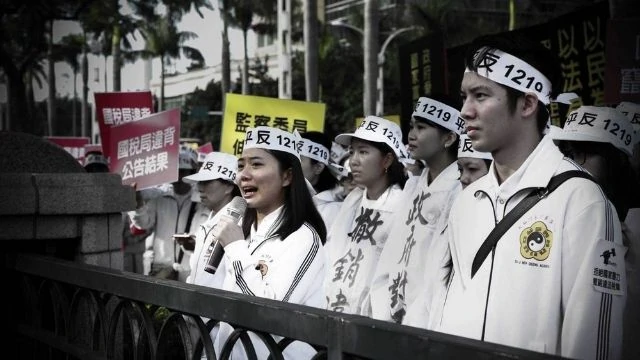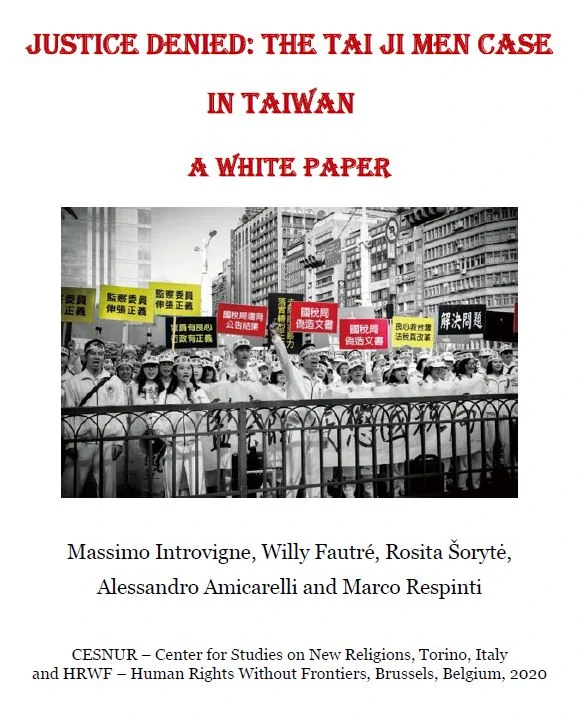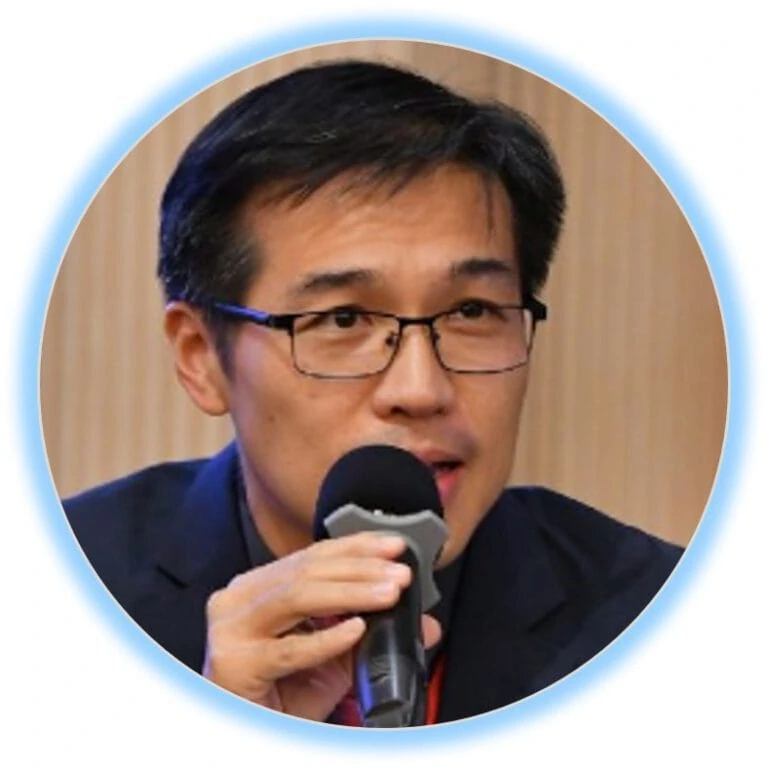CESNUR and Human Rights Without Frontiers launch a detailed report on the longest religion-related legal case in the Island’s history.
by Marco Respinti

A Tai Ji Men protest in Taiwan.
Chen Ling-Chih was a college student, and she was enjoying her Christmas holidays in 1996. On December 24, she came home only to find that her home had been searched by the police and that her father had been arrested. He would be detained for four months as a member of a spiritual movement, Tai Ji Men, accused by Prosecutor Hou Kuan-jen of being a dangerous “cult.” Her father was later found innocent of all charges and obtained monetary compensation for the wrongful detention, but only after thirteen years. Chen continued to be bullied by teachers and students at schools for being a dizi (disciple) of Tai Ji Men. Fed up, she went to study in France. Her father died in 2014, still persuaded he and Tai Ji Men had not obtained full justice.

Chen Ling-Chih
Wen Shang-Bin remembers his beloved aunt, Wen Hsiu-chen, also a Tai Ji Men dizi. One day after the arrest of Tai Ji Men’s leader, Dr. Hong Tao-Tze, by Prosecutor Hou on December 19, 1996, the aunt was interviewed by the media and defended her shifu (master). This led her husband, who believed the negative publicity against Tai Ji Men created by Hou in the media, to throw her out of the family home. Her house was raided. She was interrogated by Hou, exposed in the media, and eventually demoted from her position as a top executive in a well-known publishing house. The incident took a severe toll on her health, and she died less than three years after.
The tragic story of Weng Hsiu-Chen is part of a White Paper released on December 10 by CESNUR, the Center for Studies on New Religions, and Human Rights Without Frontiers, titled “Justice Denied: The Tai Ji Men Case in Taiwan,” available for free download on CESNUR’s Web site. Four of the authors—Massimo Introvigne, Willy Fautré, Rosita Šorytė, and myself—are from the Bitter Winter team. London-based human rights attorney Alessandro Amicarelli, the fifth author, has also published in Bitter Winter.

Cover of the White Paper.
At a press conference on December 10, where I served as chair and moderator, Introvigne explained that “White Paper” is an expression coined by Winston Churchill in 1922, to indicate an in-depth report by independent experts on a crucial issue. And, he said, the Tai Ji Men case is indeed a crucial issue of human rights, explaining why the White Paper was launched on December 10, Human Rights Day. The White Paper summarized what Tai Ji Men is—a menpai (similar to a “school”) of Qigong and martial arts rooted in esoteric Taoism, why it was persecuted in 1996 as part of a larger crackdown on spiritual movements believed (in the Tai Ji Men’s case, falsely) to be hostile to the then Taiwan’s government, and how, even after it won all legal cases, it is still a victim of administrative persecution by the National Tax Bureau. Despite conclusions by the courts that he was never guilty of tax evasion, the Bureau used technicalities to maintain its tax bill against Hong for the year 1992, and this year has seized, auctioned, and confiscated property belonging to him.
Watch the video of the press conference:
After these latest events, protests erupted in the streets of Taiwan. Fautré told the moving story of Ms. Huang, a peaceful 60-year-old housewife who was arrested and interrogated on September 19, 2020, simply for holding a sign criticizing Ms. Lee Gui-fen, one of the officers responsible for the seizure and auction of Hong’s property.
After 24 years, Tai Ji Men’s is the longest religion-related legal case in Taiwan. Amicarelli and Camelia Marin, project coordinator of the NGO Soteria International, stated that its international relevance stems from the fact that using taxes to discriminate against movements labeled as “cults” is becoming increasingly common in various countries. Marin offered several European examples of how this continues to happen, notwithstanding some firm interventions by the European Court of Human Rights.

Camelia Marin.
Another important element of this unfortunate saga powerfully emerged in the press conference. Alan Shih, Gill Wang, and Ann Chen are all Tai Ji Men dizi who live in the United States. They participated in Hong’s activities on behalf of world peace, which made him well-known and respected in several countries and the United Nations. They reported how their American friends respect and admire them for their efforts. But they contrast this with the fact that in Taiwan friends and relatives, when they hear the words “Tai Ji Men,” still refer to Prosecutor Hou’s old accusations and regard them as part of a “cult,” even after the highest court in Taiwan has cleared the movement and Hong of all charges.
Gao Ding-Yi, a dizi who lives in Taiwan, insisted on the negative effect of anti-Tai-Ji-Men propaganda spread on the Internet. Gao believes that his wife and he achieved great benefits from becoming dizi. They were told by doctors they could not have children, he reported, yet by practicing Qigong and adopting the healthy lifestyle recommended by Tai Ji Men they ended up with four offspring. All this, Gao insisted, would never have happened had they believed the bad information they had found by Googling “Tai Ji Men.”

Gao Ding-Yi.
Even if Tai Ji Men won all its court cases, the consequences of the negative image created by Prosecutor Hou remain. And the tax case is both a consequence and a sign of a persecution that does not want to go away. This is why studying the White Paper is a worthy exercise, not only for those interested in Taiwanese spirituality but for all friends of religious liberty and human rights.
Source: Bitter Winter
